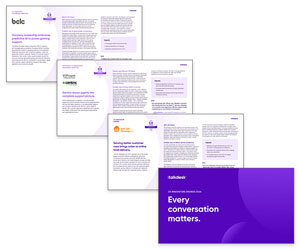With 2024 just around the corner, we asked our panel of experts to cast their predictions.
Here’s what they said about how contact centres will most likely change and develop in the year ahead…
1. AI Will Mean More – Not Fewer – Agents

Faced with the rise in AI-driven tech to deliver fast, efficient customer service, you might expect the number of agents to decrease as technology successfully takes over many traditional contact centre tasks, but therein lies an interesting paradox.
In fact, over two-thirds (70%) of contact centre managers predict an increase in the number of agents over the next decade as frontline teams adapt to their new role as brand ambassadors while embracing the growing complexity of customer enquiries.
As self-service gets better and better at handling the “easy” questions, the value of agents who can think critically and provide empathetic problem solving will skyrocket.
The true power of AI lies in activating agents of the future, better supporting them with the skills they need to succeed. That is probably why ‘augmenting agent and manager productivity’ is considered the top AI feature by 25% of contact centre managers as we move into 2024.
Contributed by: Dave Hoekstra, WFM Evangelist, Calabrio
2. Contact Centres Will Increasingly Focus on Shift Flexibility

Contact centres will evolve their practices to arrive at a mutually beneficial way of working that gives agents work–life balance and flexibility, while also ensuring that the operation is run effectively.
Contact centres want to give agents more control and flexibility over their schedules, but have previously been prevented from doing so because of the risk to service levels and unmanageable admin.
That’s why technology lets agents self-serve shift changes, moving part or all of a shift to another time – providing there is no impact on service levels. It opens the door to unparalleled levels of flexibility, which helps attract and retain the best contact centre agents.
Contributed by: Simon Beck, Head of Sales, QStory
3. Companies That Embrace Generative AI Will Gain a Competitive Advantage

Generative AI in the contact centre environment will likely bring improved personalization, predictive customer service, continuous learning, and multimodal interactions fostering a blend of human–machine collaboration in ways previously unimagined.
Despite the scepticism surrounding this technology, GenAI will not replace the contact centre agent but will augment their role, enabling them to focus on more meaningful work.
Companies that embrace the game-changing power of GenAI stand to gain an undeniable competitive advantage.
Contributed by: Astrid Pocklington, Head of Corporate Content & Communications, Enghouse Interactive
4. Employees Will Have Greater Flexibility to Work From Anywhere

The future office will transcend fixed locations in 2024, enabled by universal cloud technology and communication platforms.
No longer will the choice be restricted between the workplace and home; employees will increasingly be able to work from other locations, thanks to advanced technology such as personal video conferencing cameras with AI-driven features that make it feel like you’re meeting face to face, and professional headsets that reduce background noise and distractions.
This means more productive virtual meetings and impactful presentations, and giving employees greater flexibility to work from anywhere.
We’ll also see a shift in how workspaces are used – with more organizations adopting open-plan designs and different working zones to foster collaboration and social interaction.
AI will underpin these trends, helping to create efficient, interconnected digital workplaces that adapt to the needs of modern professionals.
Contributed by: Nigel Dunn, VP and MD EMEA North, Jabra
5. Forecasting, Scheduling, and Real-Time Management Will Become More Complicated
According to a survey of workforce planners that we ran in November 2023, 66% of respondents find forecasting, scheduling and real-time management more complicated than they were five years ago.
Their comments revealed that this trend is set to accelerate in 2024, for several reasons:
- The growth of digital channels means that legacy methods of forecasting and staffing calculation don’t work.
- Increasing customer self-service leads to more volatile handling times.
- Scheduling a multiskilled, multichannel workforce was always a challenge.
It’s no longer a challenge faced just by a minority of contact centres at the cutting edge – it affects everyone. Remote and hybrid working create new headaches for real-time management. In 2024, you’re going to need a WFM application that is ready for all these challenges.
Contributed by: Chris Dealy, WFM Evangelist, injixo
6. LLMs Will Drive Significant Practical Applications

As we look to 2024, the convergence of AI and automation is crucial for CX strategy and shaping customer engagement.
AI integration will continue to develop across industries, revolutionizing customer experiences through predictive analytics, personalized interactions, and enhanced process automation.
Large language models (LLMs) will also drive significant practical applications in contact centres, streamlining operations, and elevating service quality.
Enterprises will continue migrating to cloud-based solutions for scalable and flexible CX platforms, and the resurgence of self-service via LLM-powered chatbots within contact centres will redefine customer engagement.
Proactive customer engagement and simplified data integrations will also enable customer engagement, fostering deeper and more informed interactions across various touchpoints.
Contributed by: Nick Delis, SVP of International Sales, Five9
7. Cloud Adoption Will Peak
AI advancements will lead to a 70% increase in cloudification in the CX industry in 2024, with companies realizing the necessity of bringing their operations to the cloud to be able to fully utilize AI and succeed in the digital era.
Organizations will also no longer be able to manage their complicated tech stack of patchwork solutions. In the age of AI, organizations can’t afford to operate like this any longer. They need their data to be easily accessible and shareable.
Organizations will move to adopt a single, open cloud interaction platform, allowing them to seamlessly connect third-party resources with native capabilities on the platform.
8. The Gap Will Widen Between Good and Bad AI

AI is the answer to managing the overwhelming complexity of customer service in the digital omnichannel age.
But that does not mean that all AI is created equal. Next year, we anticipate that many businesses will struggle to optimize AI tools for their needs.
Intelligently communicating with customers, supporting contact centre agents, and operating in the cloud at scale are all vital parts of successful CX.
Only AI which has been purpose-built and trained on millions of customer interactions will be suitable and trustworthy to manage a business’s CX efficiently and effectively.
Contributed by: Barry Cooper, President, CX Division, NICE
9. Analysis of 2% of Interactions Won’t Be Enough

With the democratization of data and advent of AI, contact centres have put themselves in the picture when it comes to building an advanced understanding of the customer.
Gone are the days where analysis of 2% of interactions was enough. In 2024, 100% coverage should be the standard all contact centres work towards, making it possible to uncover meaningful insights that truly reflect the customer experience, not just a small sample size.
Drilling down into the data is where the real value lies, so real-time dashboards and reports that focus on the metrics that matter should be the norm. The result will be more joined-up strategies, business-wide improvements, and happier customers.
Contributed by: Jaime Scott, CEO, EvaluAgent
10. AI Will Continue to Enhance Contact Centres
In 2024, the contact centre will undergo a significant transformation thanks to AI, whose impact is entirely new.
Tech giants are already enchanted by this revolution, and the initial changes observed are markedly different from those generated by CTI in the early 2000s. AI enhances data accuracy and contact centre productivity, optimizing advisors’ work and enriching the customer experience.
Indeed, AI enhances the working conditions of supervisors and agents, thereby contributing to a reduction in turnover.
Transcription, summarization, voicebots, automatic call categorization, sentiment analysis, and quality monitoring allow advisors to focus on more complex and meaningful interactions with customers.
Indeed, AI’s influence on customer relationships is undeniable. It fortifies automation mechanisms, amplifies communication personalization, and promotes agents’ proactivity. These advancements result in an improved CX and to a significantly reduced churn rate.
Contributed by: Diabolocom
11. Ticket-Based Systems Will Be Replaced by Interaction-Based Systems

Ticket-based systems will be phased out in 2024 and will be replaced by interaction-based systems to provide a more modern, seamless help-desk approach.
Generative AI is enabling organizations to build more robust knowledge bases and train more intelligent chatbots.
This will allow organizations to move to interaction-based systems, being able to answer enquiries on any channel, automating many support requests and reducing the need for manual intervention by support staff.
Contributed by: John Willcutts, GM of Digital and AI, NICE
12. The Surge in Non-Traditional Contact Centres Will Continue

We’re seeing demand for contact centre technology for a reduced workforce increase, with non-traditional users of contact centres now being required to have contact centre functionalities in place.
This comes as a result of the hybrid working model and the diversification of employees.
Companies have access to a wider pool of employees than they had before, meaning we’ll continue to see a surge in non-traditional contact centres.
They therefore require a richer set of features to help solve problems and ensure smooth operations.
We also can’t ignore the fact that every business is being asked to do more with less and AI and machine learning (ML) will play a fundamental role in overcoming this.
AI will allow contact centres to service more customers with the headcount they have in place, as well as being able to make typically repetitive job roles more interesting.
AI and ML can fulfil mundane tasks and allow employees to take on more challenging roles, which will in turn help to attract and retain talent, while servicing more customers in a consistent fashion.
Contributed by: Chris Angus, VP, EMEA Contact Centre Engagement, 8×8
13. Contact Centres Will Reap Rewards From Early Investments in Technology

Customer expectations have continued to drive increased demand on the contact centre, with more complex calls and difficult conversations to navigate.
To address these concerns, many contact centres have started to look into ways to improve operational efficiencies and drive better outcomes and experiences for their employees and customers.
One way organizations have done this is through early investments into AI technology, like conversation intelligence, to gain insights and intelligence from their customer data and drive better decision-making.
Those who have already invested and started to implement this technology, including generative AI, will be well positioned to reap the rewards, ROI, and benefits in 2024.
Contributed by: Frank Sherlock, VP of International, CallMiner
14. Cybersecurity Risks Will Increase

We live in ‘interesting times’. Conflict in Europe and the Middle East looks set to continue in 2024, and there is growing tension in the Far East. What has that got to do with contact centres?
The risk of cyberattacks has never been greater, and every organization is vulnerable. Contact centres will need to invest more in robust cybersecurity measures and compliance protocols.
If they don’t do that, they risk compromising customer and employee information and failing to adhere to regulatory requirements.
It is now normal for companies to store their data in the cloud and run cloud software applications. Contact centres should double-check the privacy and data security provisions of the cloud platforms that they use.
Contributed by: Chris Dealy, WFM Evangelist, injixo
15. Contact Centres Will Stop Fearing AI

There will be a transition from fear of AI to AI FOMO, with marketers embracing AI’s ability to augment their skills and connect with consumers in a hyper-personalized way.
Marketers will no longer fear AI but will instead quickly realize if they aren’t using AI, they will be far behind their competition.
AI will not replace marketers but instead will amplify their abilities, enabling them to be more dynamic, targeted and expedient with their efforts to market in the digital era.
Contributed by: Einat Weiss, CMO, NICE
16. Leaders Will Focus on Striking a Delicate Balance

As we approach 2024, changes are unfolding in the contact centre landscape. Our recent study indicates that contact centre leaders are focused on striking the delicate balance between cost and performance in the coming year, aiming for optimal results without exceeding budgets.
While customer experience remains a priority, there’s a growing emphasis on agent experience and its direct link to overall performance.
AI will continue to play a significant role, advancing within the contact centre space. Leaders will be faced with finding the balance of harnessing automation while keeping the human touch in their interactions.
Attention is also shifting towards new industry regulations, with AI serving as a valuable support for contact centres navigating compliance.
Remote working will continue to be a focus in 2024, with a substantial number of agents still working from home; leaders will need to continue exploring how to best support these agents and invest in the right technologies to give them the tools they need.
Contributed by: Ben Booth, CEO, MaxContact
17. Video Will Allow Agents to Better Understand Customers’ Feelings

The use of video for interactions with customers is increasing and continues to gain weight, according to several recent studies.
Beyond the feeling of closeness offered by this medium, it provides a much more pragmatic asset. People would rather activate their smartphone camera and show the situation to the advisor than describe it.
From an agent’s point of view, we may lose efficiency: a message is transmitted/understood more quickly in writing than orally, but the video will allow the agent to better perceive the customer’s feelings. And we’re expecting the AI to accompany the agent here too (video recognition of emotions).
Contributed by: Jean-Denis Garo, Vice President Product Marketing, Odigo
18. There Will Be an Increase in Fraud Due to Deepfakes

Deepfakes are attracting growing interest from security specialists and the general public. The number of easy-to-use tools for creating fake content for malicious purposes will increase in 2024 (developed using generative AI techniques, for example).
Deepfakes in the form of vishing (voice phishing), for example, could be used as part of a fraudulent call to interact with IVR systems, and even to fool human agents, by reproducing the human voice and manipulating audio content.
While some deepfakes are impressive, specialists point out that they do not always produce perfect results.
Some attack scenarios, particularly those involving real-time interaction, require significant computing capacity and a wealth of source material, both in terms of quantity and quality
Contributed by: Bertrand Deroubaix, Risks, Quality & Security Director, Odigo
For more great insights and advice from our panel of experts, read these articles next:
- Emerging WFM Trends to Look Out For
- 10 Ways Technology Can Simplify the Contact Centre
- 5 Ways to Improve Capturing Customer Details
Author: Robyn Coppell
Published On: 21st Dec 2023 - Last modified: 27th Feb 2024
Read more about - Technology, 8x8, Artificial Intelligence, Astrid Pocklington, Barry Cooper, Ben Booth, Bertrand Deroubaix, Calabrio, CallMiner, Chris Angus, Chris Dealy, Dave Hoekstra, Diabolocom, Einat Weiss, Employee Engagement, Enghouse Interactive, EvaluAgent, Five9, Forecasting, Frank Sherlock, Future, Jabra, Jaime Scott, Jean-Denis Garo, John Willcutts, MaxContact, NICE, Nick Delis, Nigel Dunn, Odigo, Peopleware, QStory, Security, Shift Patterns, Simon Beck, Top Story, Videos








































